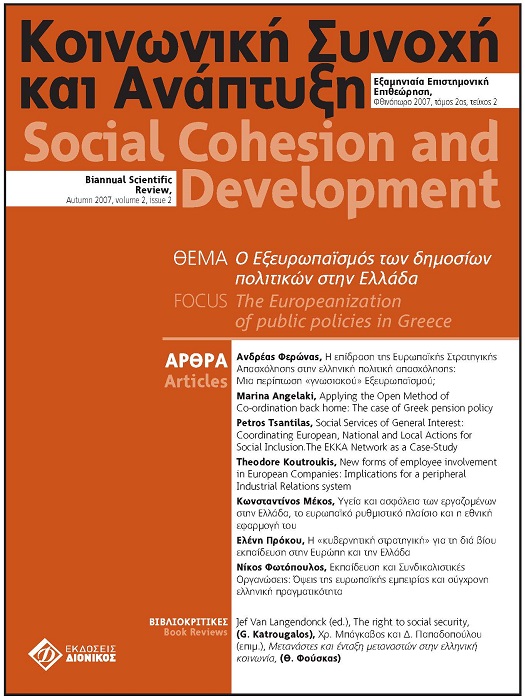Social services of general interest: coordinating european, national and local actions for social inclusion. The EKKA network as a case-study
Abstract
This paper contributes to the development of a broader framework for the identification of the key features of a functional system of social services and benefits. This should allow for the elaboration of a social services’ network ruled by common general principles and values. Related to this subject is the aim to determine –based on international experience and practices– the best way to deal with both local and national needs and vice versa. After introducing the framework of analysis used to interpret the experiences of social services providers across the European Union, we present the EKKA (National Centre for Social Solidarity) Network as an example of a coordination pole connecting the
European, the national as well as the local level. We conclude this paper by highlighting the civic added value of the activities of social services, and
voluntary social services in particular, with regard to the European Union and in the light of criteria such as their non-profit character, the special legal mandate given to them as civic actors, their mission within society, working with volunteers in particular, and their quality management system used to maintain adequate quality standards.
Article Details
- Zitationsvorschlag
-
Tsantilas, P. (2016). Social services of general interest: coordinating european, national and local actions for social inclusion. The EKKA network as a case-study. Social Cohesion and Development, 2(2), 139–154. https://doi.org/10.12681/scad.9047
- Rubrik
- Articles

Dieses Werk steht unter der Lizenz Creative Commons Namensnennung - Nicht-kommerziell - Weitergabe unter gleichen Bedingungen 4.0 International.
Authors who publish with this journal agree to the following terms:
- Authors retain copyright and grant the journal right of first publication with the work simultaneously licensed under a Creative Commons Attribution Non-Commercial License that allows others to share the work with an acknowledgement of the work's authorship and initial publication in this journal.
- Authors are able to enter into separate, additional contractual arrangements for the non-exclusive distribution of the journal's published version of the work (e.g. post it to an institutional repository or publish it in a book), with an acknowledgement of its initial publication in this journal.
- Authors are permitted and encouraged to post their work online (preferably in institutional repositories or on their website) prior to and during the submission process, as it can lead to productive exchanges, as well as earlier and greater citation of published work (See The Effect of Open Access).




